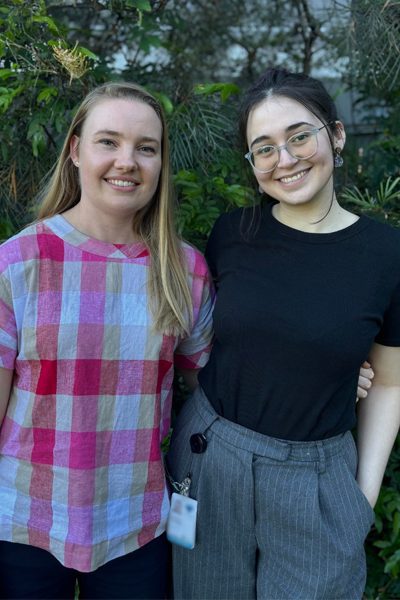
QuEDS OT Carmen (left) and Psychologist Bri (right).
Teaching social media literacy to contextualise what we see online
In today’s digital age, the pressure to meet unrealistic beauty standards is ever-present, largely fuelled by social media. Psychologist Bri and Occupational Therapist Carmen from the Queensland Eating Disorder Service shed light on comparison culture and offer valuable advice for protecting young people’s mental health.
“We are now beginning to understand the effects of social media on young people’s mental health,” said Carmen.
Twelve is the average age a young person will create their first social media account, which overlaps with the average age of onset of an eating disorder, which is between 12-25 years.
“We know we can’t stop young people from accessing social media, but we can teach them media literacy and strategies to help contextualise what they see,” added Bri.
Here are their top tips not just for young people but for anyone when accessing content online.
- Monitor how you are engaging with it – e.g. to connect with friends, doomscrolling, comparison, or specific content.
- Take on a curious approach to what you see and read – learn about media literacy and how to evaluate a source. Ask yourself:
- Is the author free of commercial interest (e.g. are they trying to sell you a product?
- Is the information written by a qualified and registered health professional?
- Does the author represent an established and reputable health organisation?
- Does the information include reliable evidence to back up its claims?
- Is the information up to date?
- Set time limits on your phone as a reminder of how long you have been on it for to check in and reflect.
- Understand the social media platform that you are using, generally the more content you search for, the more it will automatically fill up your feed.
- Know how to reduce and block sensitive content.
- Decide what content you want to see more of and follow/view more of those pages.
“By equipping people of all ages but especially young people with the skills to contextualise what they see online, we hope that everyone can begin to have a healthier relationship with social media,” Bri added.
An eating disorder can impact anyone at any age. If you or someone you know is struggling with an eating disorder, reach out to the Queensland Eating Disorder Service (QuEDS) via your GP for support.
